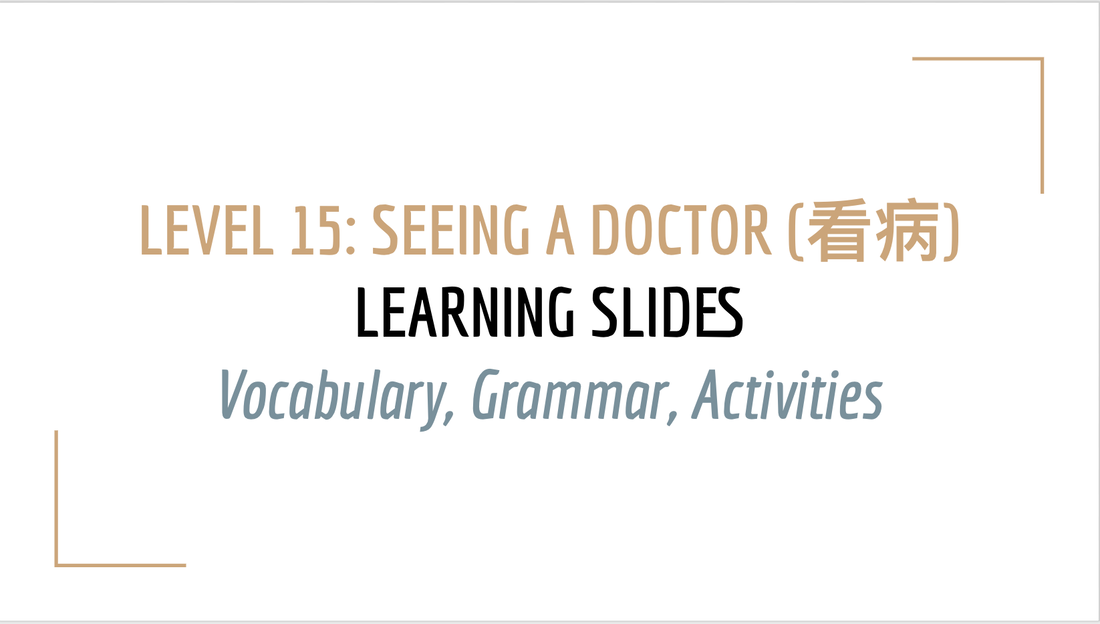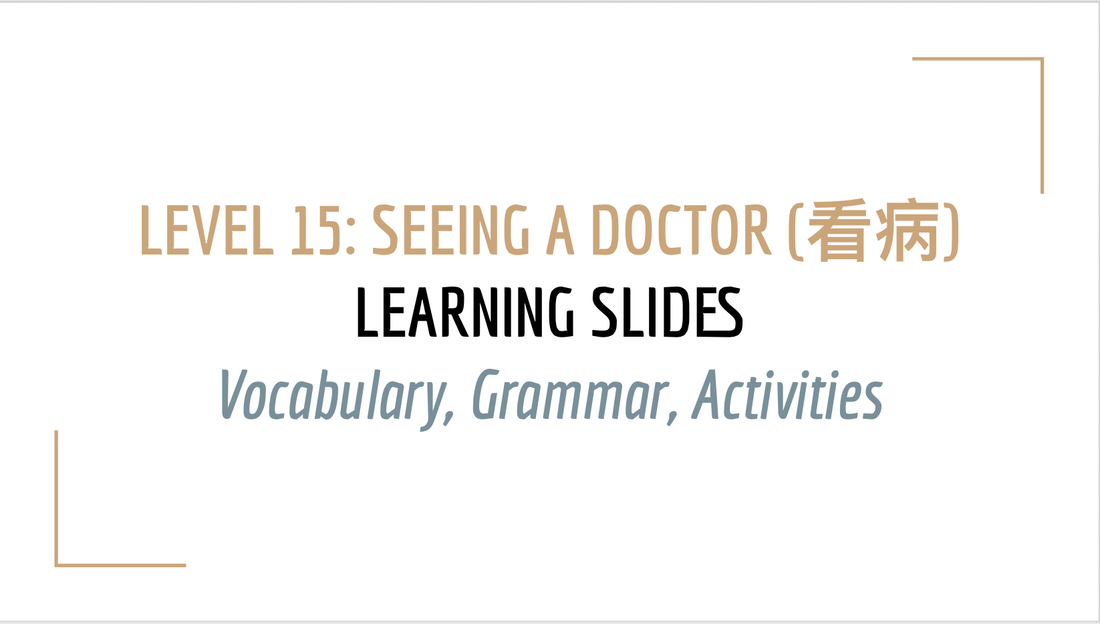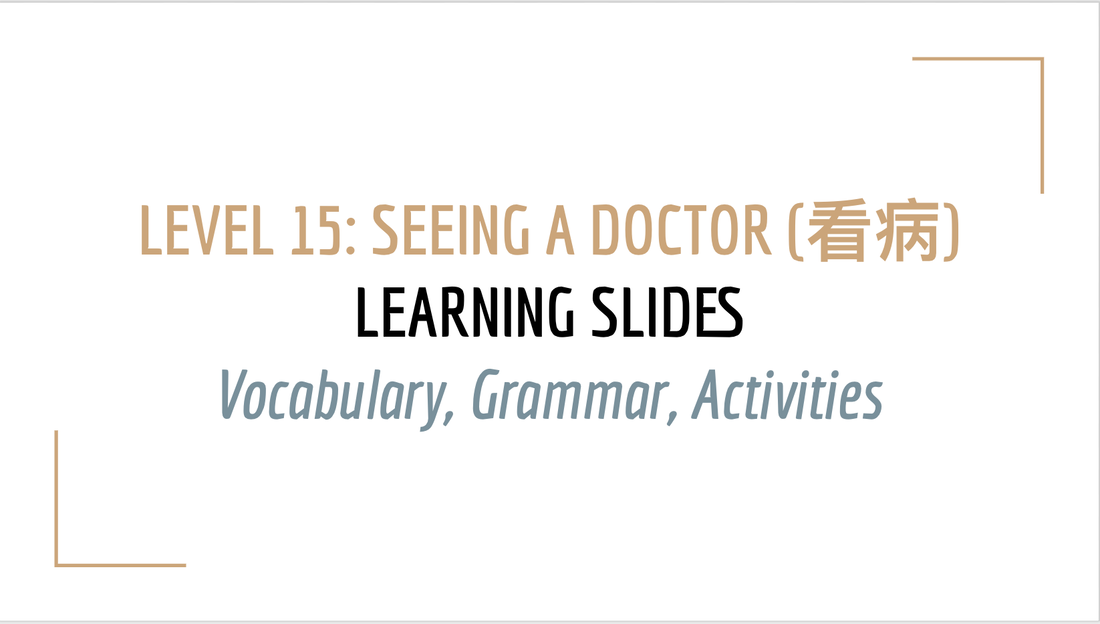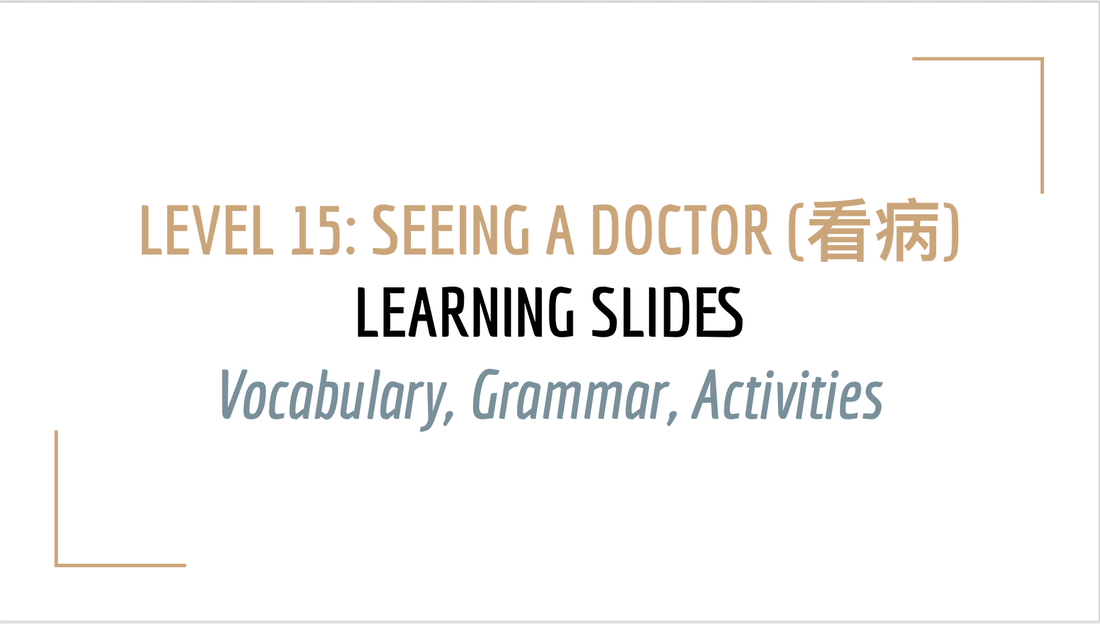Chapter 10: "Collapse"
HOW TO TALK ABOUT WORSENING SYMPTOMS
Preview
Lesson
Practice
Mastery
Preview
|
|
VERB+起来 = a complement used to show that an action or state has started and is ongoing.
疼起来了 started to hurt [and is still hurting]
越来越 (yuè lái yuè) more and more
乱 (luàn) in confusion; disorderly
|
Lesson
Practice
TRAIN: Write 3 sentences each using the following grammar structures:
WRITE: write a letter to your parents, discussing a close friend's sickness. His/her symptoms have been getting worse and worse lately. Tell them how it all began, and how it's gotten worse since then.
- verb+起来
- 越来越
WRITE: write a letter to your parents, discussing a close friend's sickness. His/her symptoms have been getting worse and worse lately. Tell them how it all began, and how it's gotten worse since then.
Mastery
DICTATION: write the Chinese characters, English definition, and pinyin (including tones):
GRAMMAR: complete the following exercises:
READING: read aloud the following sentences:
SPEAKING: perform the following conversation tasks:
- ...起来,越来越,乱
- TARGET: no more than 1 mistake, including tones.
GRAMMAR: complete the following exercises:
- Rule (in English): explain what a "direction complement" is. Describe the structure. Give examples of direction complements.
- BONUS: Explain what a "compound direction complement is." Give examples.
- BONUS: Explain what an "abstract direction complement is."
- Translate: My stomach began to hurt at night [and is still hurting], this morning I went to the bathroom several times.
- Translate: Look, my stomach is getting bigger and bigger.
- TARGET: no mistakes.
READING: read aloud the following sentences:
- 昨天晚上我吃了几口蛋糕,夜里肚子就疼起来了。
- 那你也得赶快去看医生。要不然病会越来越重。
- 再说,你不能自己乱吃药。
- TARGET: no more than 1 mistake, including tones.
SPEAKING: perform the following conversation tasks:
- Talk about when your (ongoing) symptoms began.
- Talk about symptoms getting worse and worse.
- TARGET: at least a 3 on ALL tasks.
Chapter 11: "A Pound of Flesh"
HOW TO TALK ABOUT HEALTH INSURANCE
Preview
Lesson
Practice
Mastery
Preview
|
|
健康 (jiàn kāng) health; healthy
保险 (bǎo xiǎn) insurance; to insure; safe; secure; be sure; be bound to
药店 (yào diàn) pharmacy
|
Lesson
Practice
RESEARCH: investigate the American and Chinese health insurance systems. Write a paragraph summarizing your findings.
WRITE: write a diary entry on your experience trying to get medicine at the pharmacy, using your new health insurance.
SKIT: in a group, write a dialogue about a greedy doctor and a patient without health insurance. Memorize your skit and perform in front of the class!
WRITE: write a diary entry on your experience trying to get medicine at the pharmacy, using your new health insurance.
SKIT: in a group, write a dialogue about a greedy doctor and a patient without health insurance. Memorize your skit and perform in front of the class!
Mastery
DICTATION: write the Chinese characters, English definition, and pinyin (including tones):
READING: read aloud the following sentences:
SPEAKING: perform the following conversation tasks:
- 健康,保险,药店
- TARGET: no more than 1 mistake, including tones.
READING: read aloud the following sentences:
- 为什么不去看医生?你没有健康保险吗?
- 我想也是对什么过敏了,所以去药店买了一些药。
- TARGET: no more than 1 mistake, including tones.
SPEAKING: perform the following conversation tasks:
- Talk about health insurance.
- Talk about going to the pharmacy.
- TARGET: at least a 3 on ALL tasks.
Chapter 12: "My Precious"
HOW TO TALK ABOUT HOW OFTEN TO TAKE MEDICINE
Preview
Lesson
Practice
Mastery
Preview
|
|
片 (piàn) measure word for tablet, slice, etc.
好几次 (haǒ jǐ cì) quite a few times
verb + number +次 + (object) = verbing [X number of times]
小时 (xiǎo shí) hour
|
Lesson
Practice
TRAIN: write 3 sentences using the following grammar structure:
SPEAK: role-play a doctor and patient, discussing when and how often to take medications.
WRITE: write a detailed list of instructions for a patient's medications: how many pills (of different kinds) to take, at what time, how many times a day, with meals or not, etc. Be very clear!
- 次
SPEAK: role-play a doctor and patient, discussing when and how often to take medications.
WRITE: write a detailed list of instructions for a patient's medications: how many pills (of different kinds) to take, at what time, how many times a day, with meals or not, etc. Be very clear!
Mastery
DICTATION: write the Chinese characters, English definition, and pinyin (including tones):
GRAMMAR: complete the following exercises:
READING: read aloud the following sentences:
SPEAKING: perform the following role-play:
- 片,次,好几次,小时
- TARGET: no more than 1 mistake, including tones.
GRAMMAR: complete the following exercises:
- Translate: Q: Doctor, how many times a day [do I take medicine]? / A: Three times a day, two pills at a time.
- Translate: Last time I was sick, I didn't go to the doctor.
- TARGET: no mistakes.
READING: read aloud the following sentences:
- 吃这种药,一天三次,一次两片。
- 昨天晚上我吃了几口蛋糕,夜里肚子就疼起来了,今天早上上了好几次厕所。
- 昨天我吃了三次药。
- 不过,你最好二十四小时不吃饭。
- TARGET: no more than 1 mistake, including tones.
SPEAKING: perform the following role-play:
- Talk about how often to take medications.
- How many times a day?
- How many tablets each time?
- TARGET: at least a 3 on ALL tasks.
Chapter 13: "There Can Be Only One"
HOW TO TALK ABOUT DISPOSING OBJECTS
Preview
Lesson
Practice
Mastery
Preview
再说一遍 (zài shuō yī biàn) say that again
遍 (biàn) measure word for instances of an action
把 (bǎ) indicating a thing is disposed of
- 医生,一天吃几次药?请您再说一遍。
遍 (biàn) measure word for instances of an action
把 (bǎ) indicating a thing is disposed of
- There is a special type of sentence in Chinese called a “把 sentence.” These sentences are very common, especially in spoken Chinese. The grammar is a bit tricky, however!
- See p. 142-144 in the textbook.
- See https://www.chineseboost.com/grammar/ba-structure-usage-basics/.
- See http://resources.allsetlearning.com/chinese/grammar/%22Ba%22_sentence.
- 你把蛋糕放在哪儿了?
- 你吃蛋糕把肚子吃坏了。
- 把你买的药拿出来给我看看。
- STRUCTURE: subject + 把 + object + verb + other element (complement/了/etc.)
- Note how the standard Chinese S + V + O word order is flipped to S + 把 + V +O. The meaning is the same, the word order is different.
- There must be something after the verb that describes what happened to the object.
- 你把功课给我 =(你)给我功课 = Give me the homework.
- 把蛋糕给我 =(你)给我蛋糕 = Give me the cake.
- 把一片药给我 =(你)给我一片药 = Give me the table of medicine.
- Why use a “把 sentence” at all? 把 is used to highlight what happens to the object (called “disposal”). Disposal simply means that something happened to the object and it was affected.
- use 把 to talk about things being put in places
- Use 把 to talk about things being changed
- Use 把 to talk about things being finished or used up
- 把蛋糕放在冰箱= [You ought to] put the cake in the refrigerator.
- 你把这个字写错了。= You wrote this character incorrectly.
- 把这杯咖啡喝了!=Finish up this cup of coffee!
- If the verb in a Chinese sentence is followed by the prepositional phrase 在 or 到, the sentence MUST be written using the a 把 structure. Thus, 把 is required when talking about things being put in places.
- 你把书放在桌子上。= Put the pen on the desk. [把 REQUIRED]
Lesson
Practice
TRAIN: write 6 sentences using the following grammar structure:
PUZZLE: Convert the following sentence into a "把" sentence: (你)给我功课。
SPEAK: role-play a doctor and patient, discussing the patient's illness and treatment, including medication. Try to use the "把" structure in this role-play.
WRITE: write a diary entry on your visit to the doctor's office. Make sure to specify all the things the doctor said or asked you to do, using "把."
- 把
PUZZLE: Convert the following sentence into a "把" sentence: (你)给我功课。
SPEAK: role-play a doctor and patient, discussing the patient's illness and treatment, including medication. Try to use the "把" structure in this role-play.
WRITE: write a diary entry on your visit to the doctor's office. Make sure to specify all the things the doctor said or asked you to do, using "把."
Mastery
DICTATION: write the Chinese characters, English definition, and pinyin (including tones):
GRAMMAR: complete the following exercises:
READING: read aloud the following sentences:
SPEAKING: perform the following conversation tasks:
- 再说一遍,把
- TARGET: no more than 1 mistake, including tones.
GRAMMAR: complete the following exercises:
- Rule (in English): Explain the "把 structure." Describe its structure and describe in what situations it is commonly used. Give examples of the 把 structure in context.
- Translate: Where did you put the cake? [把]
- Translate: You upset your stomach by eating that cake. [把]
- Translate: Take out the medicines you bought, let me take a look. [把]
- Translate: You forgot your girlfriend's birthday? [把]
- Detective (find and fix the mistakes): 你放笔在桌子上。
- Detective (find and fix the mistakes): 把这杯咖啡喝!
- TARGET: no mistakes.
READING: read aloud the following sentences:
- 医生,一天吃几次药?请您再说一遍。
- 你把蛋糕放在哪儿了?
- 你吃蛋糕把肚子吃坏了。
- 把你买的药拿出来给我看看。
- TARGET: no more than 1 mistake, including tones.
SPEAKING: perform the following conversation tasks:
- Ask someone to repeat what they said.
- Talk about placing or moving objects in different locations.
- TARGET: at least a 3 on ALL tasks.
MINIBOSS #3: ACT 3 REVIEWMastery Challenge 1 (Vocabulary and Grammar):
Mastery Challenge 2 (Speaking):
BONUS CHALLENGES:
|
© 2019 Hugo Xiong. [email protected]








